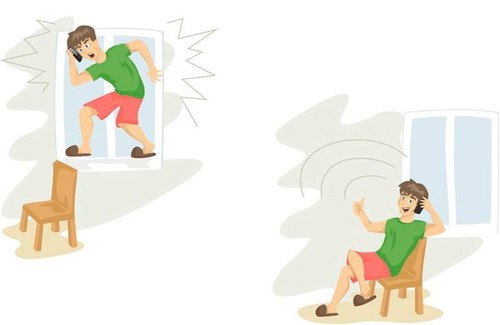
Cellular communication densely entered life of each inhabitant of the earth, but not everyone can use it to the full. Even having a cell phone with a connected SIM card and a positive balance, you can stay out of the reach of other subscribers.
Bad communication may be due to the following reasons:
- Remote base station operator from your premises.
- The presence of natural barriers. This may be a forest belt or mountainous terrain in the path of the GSM signal.
- The location of your premises in a remote place. For example, on the ground floor or in a metal-enclosed hangar.
- In the city, the signal quality is influenced by the dense urban development and the overload of the operator's base stations.
But it is not all that bad. For more than ten years in online stores you can see mobile amplifiers for sale - repeaters. The cost of a good kit can range from 10,000 to 25,000 rubles, which is commensurate with the cost of a tablet or smartphone. In order to spend your money wisely and get a good amplifier, we ranked the average cellular amplifiers with coverage from 800 m.2operating at 900 MHz.
Full coverage of the signal emanating from the amplifier is ensured only if there are no obstacles in the radius of action. In order for the signal to spread over the entire area, the following conditions must be met:
- The receiver is installed in a place where there is a good signal;
- Minimum cable length selected;
- The operator’s base station provides coverage on your site;
- There are no metal and concrete barriers.
Using the search, we found the following models of amplifiers that can improve cellular communication in a room of more than 800 m2. These models are able to divide the signal into several zones.
- Aileron AE-970;
- Vector R-810;
- Picocell 900 SXA;
- MWS-EG-B23;
- StrongCall Mx70;
- Anytone-700.
Testing will be performed on the following parameters:
 1) Output Power
1) Output Power
2) Gain
3) Automatic Gain Control (AGC)
4) Basic equipment
5) Cost
So let's get started! Consider everything in order.
output power
This parameter directly affects the created coverage area. If the output power is low, there is no good coverage.
Output power is measured in dBm (dBm) and mW. For convenience of calculations, we take one value for zero in order to carry out calculations relative to it. So, if we take for the zero level - 1 mW, then there appears such a unit as dBm (1 mW = 0 dBm).
 Almost all devices under consideration have power indicated in dBm, except for MWS-EG-B23 - expressed in mW, and StrongCall Mx70 - specified in both mW and dBm.
Almost all devices under consideration have power indicated in dBm, except for MWS-EG-B23 - expressed in mW, and StrongCall Mx70 - specified in both mW and dBm.
On paper - all applicants have an output power value higher than 20 dBm, which is quite enough to cover the area of 800-1000 m2. But we do not just compare the values specified in the instructions. We have the technical ability to check the actual value of the output power. Measurement of output power and distortion will be carried out by a spectrum analyzer. Rohde & Schwarz FSH3.
The summary table shows the data obtained during testing (for your convenience, the output power value is given in both mW and dBm):
Table number 1
| Device | Declared output power, dBm / mW | Actual dBm / mW |
|---|---|---|
| Aileron AE-970 | 20/100 | 17/50 |
| Vector R-810 | 27/500 | 27/500 |
| Picocell 900 SXA | 20/100 | 20/100 |
| MWS-EG-B23 | 23/200 | 23/200 |
| Strongcall mx70 | 20/100 | 20/100 |
| Anytone-700 | 27/500 | 26/398 |
As we see, not all models have the declared output power “friendly” with the actual. The models turned out to be honest: VectorR-810; Picocell900 SXA; MWS-EG-B23 and StrongCall Mx70.
But some of them are not so good.
- In the Media Wave brand amplifier, the actual output power is similar to that stated, but this creates a high level of interference towards the operator's base station. The device will not be able to work correctly when the signal levels from different operators are skewed. It is especially dangerous to place the amplifier near the operator's tower.For the city, the use of this model is not recommended.
- Amplifier Vector R-810 also excelled. Having a high level of output power, it emits spurious emissions towards the base station. Another device that should not be used in urban environments.
The strongest and safest for the operator's base station are the StrongCall Mx70 and Picocell 900 SXA amplifiers. They get the highest score.
Table number 2
| Device | Score |
|---|---|
| Aileron AE-970 | 6 |
| Vector R-810 | 6 |
| Picocell 900 SXA | 10 |
| MWS-EG-B23 | 6 |
| Strongcall mx70 | 10 |
| Anytone-700 | 8 |
Gain
One of the main parameters, which indicates how much dB the repeater can amplify the output signal relative to the received one. To check this, it is enough to install the Netmonitor program on the smartphone with the Android platform. Having done this, we will see the signal level in the room and will be able to determine the location of the base stations of the operator. A bad signal will be characterized by a value of minus 90-110 dB. For a good level of the signal characteristic value of minus 65-75 dB.
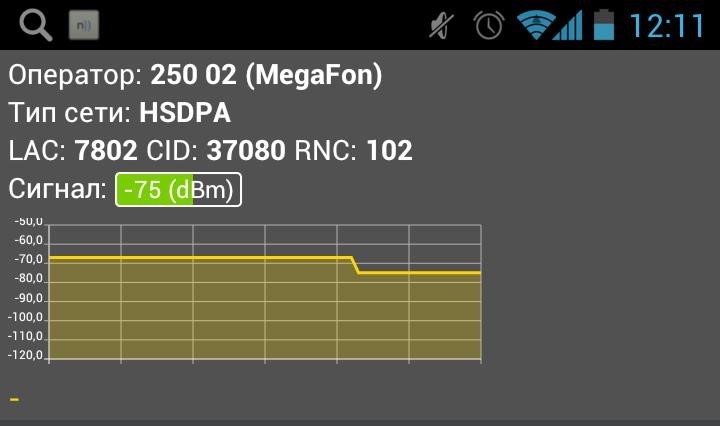
We tested the stated indicators of the contestants. The obtained data are reflected in the table №3.
Measurement of gains and non-uniformity of the frequency response were carried out by a vector network analyzer REVIEW-804/1
Table number 3
| Device | KU on the passport, dB | KU actual, dB |
|---|---|---|
| Aileron AE-970 | 70 | 66 |
| Vector R-810 | 75 | 72 |
| Picocell 900 SXA | 70 | 69 |
| MWS-EG-B23 | 65 | 64 |
| Strong call mx70 | 70 | 69 |
| Anytone-700 | 70 | 67 |
Unfortunately, not all contestants passed this test. The test leaders are again StrongCall Mx70 and Picocell 900 SXA. At the current stage they were joined by an amplifier from MediaWave. The repeaters of these brands showed the actual KU performance closest to that stated. 1 dB difference can be attributed to the error.
We will place the estimates
Table number 4
| Device | Score |
|---|---|
| Aileron AE-970 | 6 |
| Vector R-810 | 7 |
| Picocell 900 SXA | 9 |
| MWS-EG-B23 | 9 |
| Strongcall mx70 | 9 |
| Anytone-700 | 7 |
Automatic Gain Control (AGC)
When choosing a repeater, this indicator can not be ignored. It is very important, however, manufacturers do not provide reliable information on it. The higher the value and speed of the AGC response, the more efficient and safer the amplifier will operate for the operator's base station.
Table number 5
| Device | ARU on the passport, dB | AGC actual, dB |
|---|---|---|
| Aileron AE-970 | 45 | 30 |
| Vector R-810 | - | 30 |
| Picocell 900 SXA | 25 | 25 |
| MWS-EG-B23 | - | 40 |
| Strongcall mx70 | 45 | 45 |
| Anytone-700 | 30 | 30 |
In addition to the AGC value itself, it is important that the system automatically fires and does not load the operator’s base station once again. The AGC indicator on repeaters with an output power of 100 mW should be of the order of 40-45 dB, which will allow the equipment to work comfortably without interfering with the operator’s cells.
 As for the model Aileron AE-970, its indicator AGC is overestimated by 1.5 times. In addition, the triggering occurs with a noticeable delay.
As for the model Aileron AE-970, its indicator AGC is overestimated by 1.5 times. In addition, the triggering occurs with a noticeable delay.
Vector R-810 and MWS-EG-B23 surprised us - we could not find information on the AGC indicator. But in fact he is. If the device from MediaWave, this figure is normal and is 40 dB, then the model Vector R-810 is low (30 dB).
Only a Russian-made repeater StrongCall Мх70 passed the test. And the indicator of the AGC in 45 dB corresponds to reality, and the operation occurs instantly. In testing on this indicator, the StrongCall Mx70 amplifier won a landslide victory.
Table number 6
| Device | Score |
|---|---|
| Aileron AE-970 | 6 |
| Vector R-810 | 7 |
| Picocell 900 SXA | 7 |
| MWS-EG-B23 | 9 |
| Strongcall mx70 | 10 |
| Anytone-700 | 7 |
Basic equipment
As a rule, the price of the amplifier does not include the cost of additional accessories, which are mandatory components of the system.
Inherent components of the gain system in addition to the repeater unit itself:
- External receiver (receiving antenna). It receives a signal from the base station and transmits to the repeater;
- Internal antenna. Creates a coverage area indoors;
- Communication cable. Connects the device with external and internal antenna;
- RF connectors. Screw on a communication cable for further connection with antennas and a repeater.
On the Internet, we found a complete set of repeaters involved in testing. Let's try to make out the basic equipment of each of them.
Aileron AE-970
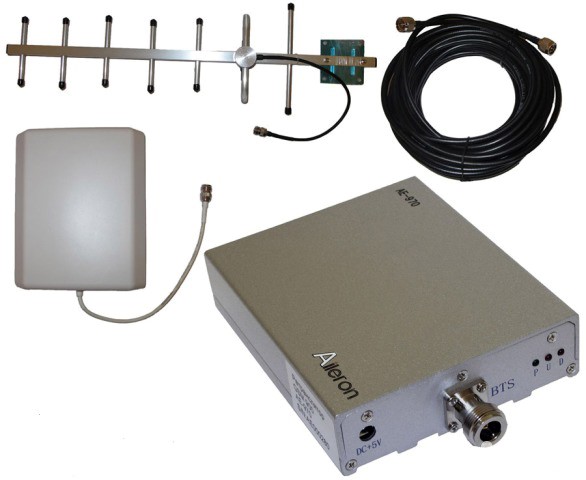
10 600 rubles
- External narrow-beam antenna type Yagi c KU 11 dB.
- ANT-65 indoor panel antenna with a KU 6.5 dB.
- Communication cable 5D-FB 10 meters.
- Power adapter.
The wire has a loss of 19.6 dB per 100 m. A good grade, but the attenuation on the cable is suspiciously high.
Vector R-810
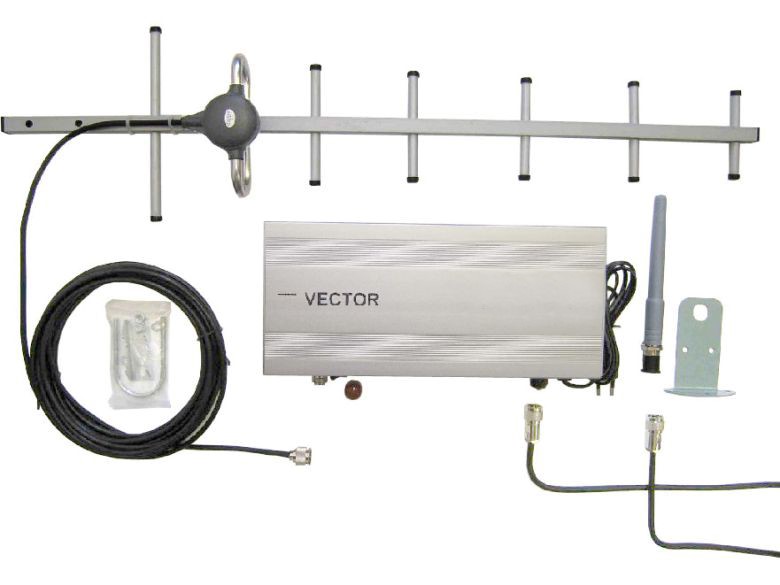
23 600 rubles
- External narrow-beam antenna type Yagic KU 13 dB.
- Antenna internal, whip with KU 2.5 dB.
- Communication wire 15 meters.
- Built-in power adapter.
Cable loss is 27.2 dB per 100 m. The slightest obstacles will churn the signal or even drown it.
Again, a pin type receiver is not the best choice. Moreover, for midrange amplifiers, like the ones we are currently considering.
The power supply is built into the case, and this is another drawback. If it fails, there will be serious difficulties with the repair. You can’t easily buy a new power supply and quickly change it.
Picocell 900 SXA
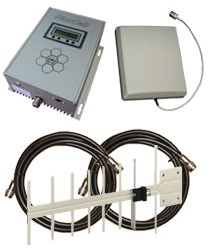
26 940 rubles
We did not find ready-made kits, so we will select them ourselves, guided by the price list of the manufacturer.
- All-weather directional antenna with KU 11 dB.
- Internal panel antenna AD-806-01P with KU 6 dB.
- Cable assembly 5D-FB10 meters + 5 meters.
- Power adapter external.
Cable loss - 19.7 dB per 100 m. A good grade, but the attenuation rate is still high.
MWS-EG-B23
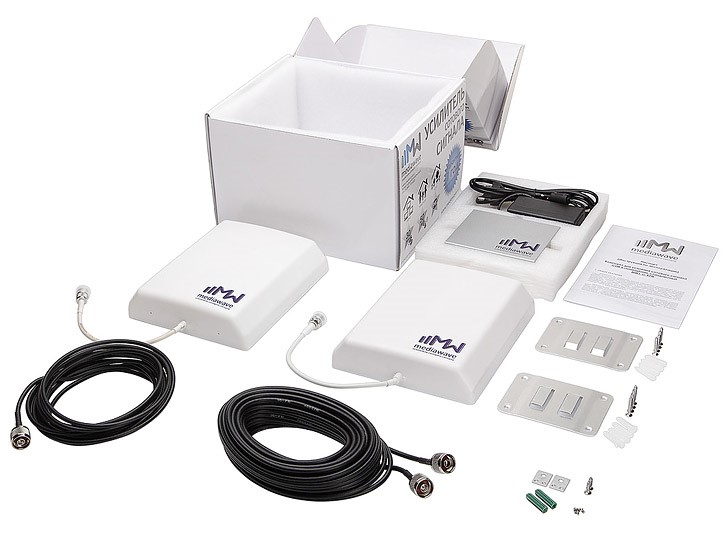
14 500 rubles
- All-weather panel antenna with KU 9 dB.
- Internal panel antenna AD-806-01P with KU 9 dB.
- Cable assembly RG45 10 meters + 5 meters.
- Power adapter external.
The signal loss per 100 m cable is 19.6 dB. A good complete set again brings attenuation indicator on the cable.
Strongcall mx70
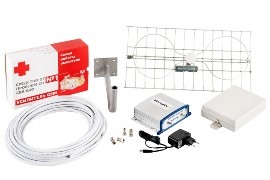
16 300 rubles
The set of equipment is called “Profi Mh70”.
Well, let's see what is the domestic "Profi".
- All-weather directional receiver with KU 10 dB.
- Arp900 indoor panel antenna with KU 7 dB.
- Communication wire Sat-50 10 meters + a set of connectors.
- Bracket for mounting the external receiver.
- Power adapter external.
Cable loss is 18.7 dB per 100 m. Good equipment, and losses are not critical.
Anytone-700
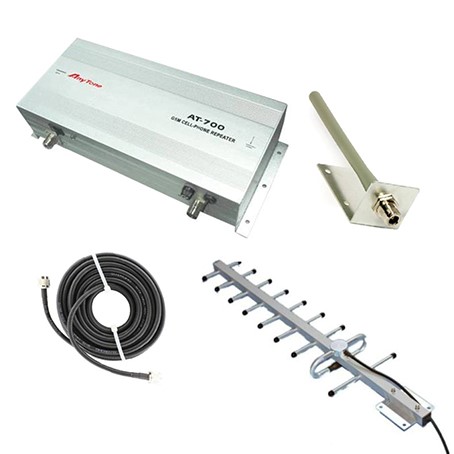
22 100 rubles
- All-weather directional antenna with KU 13 dB.
- Internal whip antenna with KU 7 2.5 dB.
- Communication cable 15 meters.
- Power adapter external.
Unfortunately, equipment vendors could not tell us the brand of cable used. Again, the pin receiver, as mentioned earlier, is not the best option.
Table number 7
| Device | Score |
|---|---|
| Aileron AE-970 | 9 |
| Vector R-810 | 5 |
| Picocell 900 SXA | 9 |
| MWS-EG-B23 | 9 |
| Strongcall mx70 | 10 |
| Anytone-700 | 6 |
Cost of
The cheapest sets have become models from Aileron and MediaWave. Picocell became our “heavyweight”. StrongCall "Profi Mh70" - the golden mean.
Estimates are given in table number 8:
Table number 8
| Device | Set cost | Score |
|---|---|---|
| Aileron AE-970 | 10 600 rub. | 10 |
| Vector R-810 | 23 600 rub. | 6 |
| Picocell 900 SXA | 26 940 rub. | 5 |
| MWS-EG-B23 | 14 500 rub. | 9 |
| Strongcall mx70 | 16 300 rub. | 8 |
| Anytone-700 | 22 100 rub. | 6 |
Grand total
Table number 9
| Device | Score |
|---|---|
| Aileron AE-970 | 37 |
| Vector R-810 | 31 |
| Picocell 900 SXA | 40 |
| MWS-EG-B23 | 42 |
| Strong call mx70 | 47 |
| Anytone-700 | 34 |
The amplifier has high and, most importantly, honest specifications. There is no negative impact on the base station. The only thing that gave this device to some other contestants, so it is in the selling price.
We recommend using equipment from the company "Quartz" and repeater Strongcall mx70 in particular.
